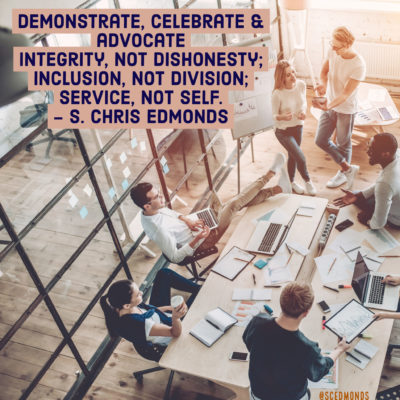Civility in our society is in short supply. Here in the US, I believe we have strayed far from the foundations of our republic.
The preamble of the US Constitution, crafted in 1787, states in part “We the people . . . in order to form a more perfect union, establish justice, ensure domestic tranquility, provide for the common defense, promote the general welfare, and secure the blessings of liberty to ourselves and our posterity . . . “ do hereby present this constitution.
Today, our society does not consistently provide justice, tranquility, welfare, or blessings of liberty for many – much less for all.
Everyone has different backgrounds, experiences, beliefs, goals, and fears. When interacting with people who have different beliefs, goals, and fears than yours, disagreement occurs.
Civil disagreement is a sign of maturity when people debate policies and principles while honoring their fellow humans. Civil disagreement is not available when people dismiss, demean, and discount others’ efforts, ideas, and accomplishments.
We must be better. Each of us plays a role in creating civil interactions or uncivil ones. We have a choice. We can treat others with trust, respect, and dignity – or not.
In today’s three-minute episode of my Culture Leadership Charge video series, I specify three ways we each can boost integrity, inclusion, and service to others, every day.
My Culture Leadership Charge series features short (two-to-three-minute) videos that describe proven culture leadership and servant leadership practices that boost engagement, service, and results across your work teams, departments, regions, and even your entire company.
Each episode’s “charge” is a challenge for everyone in your organization – not just leaders – to refine their behaviors and ensure everyone is treated respectfully at all times.
You’ll find my Culture Leadership Charge episodes and more on my YouTube channel. If you like what you see, please subscribe!
Don't miss a single episode of @scedmonds' #Culture #Leadership Charge video series - crisp & actionable! #WorkPlaceInspiration #PurposefulCulture http://drtc.me/ytube Click To TweetPhoto © Adobe Stock – vasyl. All rights reserved.
How well do the people in your “sphere of influence” treat others with trust, respect, and dignity? To what degree do you treat others kindly and graciously? Share your insights on Twitter, Facebook, and LinkedIn.




Hi Chris,
I appreciated your comments this week. I agree with your strategies for engaging in civil disagreements. Many organizations, like mine, have civility policies. Yet, supervisors and leaders regularly, actively discourage any kind of dialogue – however civil – with their subordinates. I believe you have referenced employee engagement surveys that have indicated employees want respect in the workplace and an element of that respect is the feeling that one has a voice regardless of the power differentials. In short, I think an important component of a civil workplace culture is the opportunity to be heard regardless of where you are positioned in the hierarchy. Perhaps I am speaking more about respect than civility – not sure. Do you have a video where you elaborate more on civility in the workplace, perhaps linking it to employee engagement and respect? Thank you!
Thanks, Robynn, for your comments and questions.
Civility and respect are closely linked! I don’t have a video on workplace civility (I probably need one) but this article I did for Forbes last year really focuses on it. https://www.forbes.com/sites/forbescoachescouncil/2017/04/14/four-steps-proven-to-cultivate-workplace-civility/#1de2b14537cf Let me know if this is helpful!
Cheers!
C.
Appreciate the additional information. I found this section of your article particularly important:
“The final step is to consider whether your organization’s policies and programs reward civility, or inadvertently punish it.
Ask yourself, are people working within a system that says civility is important, but when it comes to bonuses, promotions, and discipline, the system clearly rewards results over respectful behavior.”
I see organizations continually rewarding supervisor/director bad behavior if production outcomes have been achieved. But at what cost to employees doing the work? Hardly ever discussed unless the behavior has reached clear (federally/state defined) characteristics of bullying and harassment.
Thanks again,
Robynn
Thanks for reading that Forbes piece, Robynn!
You know you’re living in a “house” where the only thing that’s measured, monitored, and rewarded is results. Supervisors/directors are behaving exactly as they are being rewarded to. When the “powers that be” realize that they’re not building people up but they’re tearing people down, they might be ready to change the rules: to make values – how people treat each other – as important as results.
C.